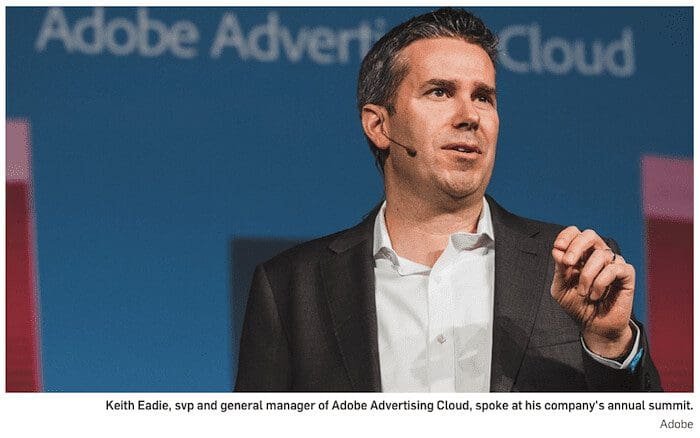
Q&A With Adobe’s Keith Eadie on Data-Led Targeting
Earlier this week at the Adobe Summit in Las Vegas, the company’s key players assembled to outline updates to its platform and address client concerns in the contemporary marketing environment.
Adweek caught up with Keith Eadie, svp and general manager of Adobe Advertising Cloud, to talk about the intricacies of data-led targeting in an era of heightened awareness over data privacy.
Adweek: How are marketers able to improve personalization as controls around the availability of data begin to tighten?
Keith Eadie: The entire world is transitioning away from third-party data, which has had sparse success depending on the campaign objective, to a world that is far more first-party data-driven [and] has to be under the umbrella of user consent, trust, transparency, etc.
The largest brands in the world are blazing a new path on how they manage user consent and how they build their customer profiles in a way that is aligned with what their consumers think should be the right experience around the ownership of their data. Some advertisers may have used third-party data in which they didn’t have any type of consent whatsoever attached to it, but now they’re starting to find that using more first-party data in advertising actually gets better media outcomes.
What efforts do you think the U.S. can learn from the rollout of GDPR in Europe, as similar legislation is drawn on the other side of the Atlantic?
There are material lobbying efforts in Washington [D.C.] by different players around driving lawmakers to set federal privacy agenda as opposed to having multiple states write up [different rules] that would mean fragmented privacy regulations. I think there’s a couple of elements that would make the deployment of a U.S. privacy law a bit smoother than what GDPR came to be. I would start with much more engagement from the infrastructure players in digital advertising to see how it could be deployed and architected.
Part of the GDPR challenge was for the industry to implement and ensure who is properly adhering to it because a lot of it was written by regulators without a lot of consultation. If you look at the IAB and its efforts to deliver a GDPR privacy consent framework, [which still has yet to fully win over Google], I think that was the industry reacting to the fact that the law that was designed really didn’t take into account whether it was implementable in the current technology architecture.
The hope I have for both regulators and industry is that they can collaborate so that we get a law that’s actually buildable.
One of the big issues …

















